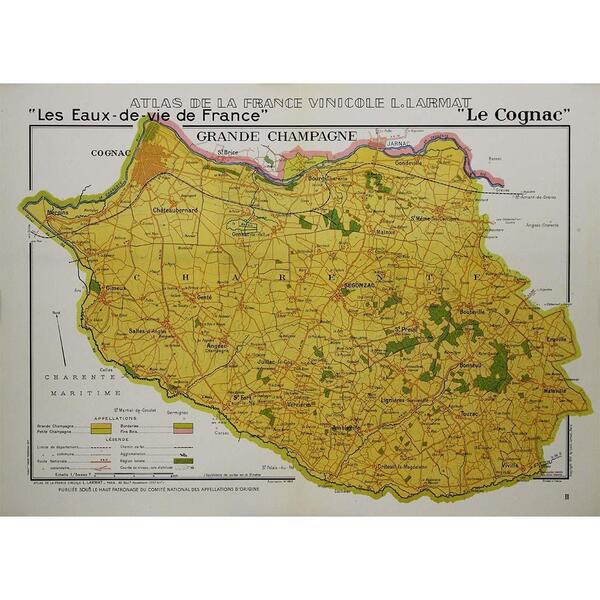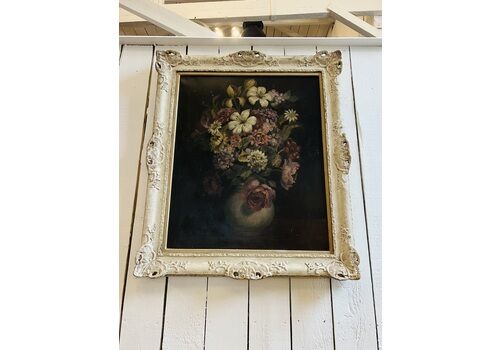Louis Larmat1947 Original Map "Les Eaux De Vie De France Le Cognac" By Larmat1947
£850 per item
Shopping at Vinterior
-
14-day return guarantee
-
Outstanding customer service
-
Secure payment
-
Buyer protection
-
Trees planted for every purchase

Item details
Height
45.0 cm
Width
63.0 cm
Depth
0.01 cm
Wear conditions
Good
Wear conditions
Excellent
Shows little to no signs of wear and tear.
Good
May show slight traces of use in keeping with age. Most vintage and antique items fit into this condition.
Average
Likely to show signs of some light scratching and ageing but still remains in a fair condition.
Apparent Wear and Tear
Visible signs of previous use including scratches, chips or stains.
Please refer to condition report, images or make a seller enquiry for additional information.
Description
The 1947 original map Atlas de la France vinicole - Les eaux-de-vie de France - Le Cognac, created by Louis Larmat and printed by Dorel in Paris, is a fascinating and detailed cartographic representation of the Cognac-producing regions of France. This map is part of the larger Atlas de la France Vinicole, a highly regarded collection of maps that meticulously charted France's wine and spirit-producing areas during the mid-20th century. Larmat's work is celebrated for its precision, artistry, and its role in documenting the rich viticultural and spirit traditions of France, specifically Cognac, one of the country’s most famous and valuable exports.
Louis Larmat, a French cartographer, is best known for his Atlas de la France Vinicole series, which provides an exhaustive visual survey of France's wine and spirit regions. Published in the 1940s, these maps not only served as valuable references for professionals in the wine and spirits industry but also became treasured by collectors and connoisseurs for their artistic detail and historical significance. Larmat’s maps are often distinguished by their hand-colored accents and detailed annotations, which offer insights into the specific geographic characteristics that define France’s diverse wine and spirit appellations.
In the case of the Cognac region, Larmat’s 1947 map highlights the various terroirs and their contributions to the production of this world-renowned brandy, known for its exceptional quality and prestige.
The Les eaux-de-vie de France - Le Cognac map is a masterful blend of cartography and vinicultural expertise. It provides a clear geographical layout of the Cognac-producing areas in western France, specifically in the departments of Charente and Charente-Maritime. The map carefully delineates the different zones that contribute to the production of Cognac, including the Grande Champagne, Petite Champagne, Borderies, Fins Bois, Bons Bois, and Bois Ordinaires. These regions, known as crus, are each labeled and color-coded, showcasing their role in creating Cognac with varying flavors, aromas, and aging potentials.
At the center of the map is a detailed layout of the region, showing rivers, towns, and vineyards, giving both geographic context and insight into how the terroir influences the final product. Cognac’s production relies heavily on its climate, soil, and topography, all of which are carefully outlined by Larmat, emphasizing the role of geography in crafting the spirit's unique characteristics.
In addition to the primary map, there are often insets that provide further details, such as information on the distillation process, aging methods, and classification of Cognac eaux-de-vie. These features make the map not only a cartographic piece but also an educational tool for understanding the complex journey from grape to bottle.
Louis Larmat’s maps are celebrated for their artistic quality, and the Le Cognac map is no exception. The hand-colored elements add a layer of vibrancy, with each cru in the Cognac region marked by distinct hues. These colors help to differentiate between the regions, making the map visually engaging and easy to interpret.
The typography used in Larmat’s maps is both elegant and functional, with regional names and place names clearly legible. There is often an ornamental title cartouche in maps of this period, which adds to the aesthetic appeal, combining practical information with artistic embellishment. The borders of the map are often decorated with grapevines, barrels, or other symbolic imagery that emphasizes the subject matter—Cognac production.
The map of the Cognac region published in 1947 came at an important time in the post-World War II period when France was re-establishing its cultural identity and reasserting its dominance in the world of luxury goods, including wine and spirits. The Cognac industry had suffered during the war, and this map can be seen as part of the broader effort to revive and promote France’s viticultural heritage. Cognac, which had long been one of France’s most prestigious spirits, regained its prominence during this period, and Larmat’s map served both practical and promotional purposes.
Maps such as Larmat’s were not only tools for producers and traders but also educational materials that helped the wider public understand the importance of terroir in the production of Cognac. The clear distinction between the different crus was crucial in demonstrating how geography affected the final product, reinforcing the idea that Cognac’s greatness was rooted in the land itself.
Today, original maps from Louis Larmat’s Atlas de la France Vinicole are highly sought after by collectors, historians, and enthusiasts of French wine and spirits. The Les eaux-de-vie de France - Le Cognac map is particularly prized for its focus on one of the world’s most renowned spirits. Maps like this are not only valued for their historical accuracy but also for their aesthetic beauty, making them popular in both private collections and public exhibitions.
Larmat’s work captures a moment in time when the tradition of French winemaking and spirit production was recovering and solidifying its global reputation. His detailed maps remain important historical documents that provide insight into the geography, culture, and economy of French viticulture and distillation in the mid-20th century.
The 1947 Atlas de la France vinicole - Les eaux-de-vie de France - Le Cognac map by Louis Larmat is a remarkable piece of cartographic and vinicultural history. Its precise detailing of the Cognac-producing regions, combined with its artistic presentation, makes it both a functional reference and a beautiful collector's item. Printed by Dorel in Paris, this map is a testament to the enduring importance of Cognac in French culture and its status as a symbol of luxury and craftsmanship. Today, it remains a valuable artifact that offers insight into the world of French brandy production and the geographic intricacies that continue to shape the Cognac industry.
Original Poster
Alcohol - Map - Charente - France
Dorel - Paris
Condition report:
Good. Good condition, original folds.
Cancellations
We offer free cancellations and full refund for orders cancelled before dispatching. View full policy.
Returns
We have a 14-day return guarantee for orders from individual sellers, within the UK and European Union. View full policy.
Free collection available
Yes
Similar Maps
Similar Maps
More from this seller
More from this seller
Choose a Wishlist
Create Wishlist
- Ships from PARIS, France
Cancellations and Returns
Last updated: 24th March 2025
We want everybody’s Vinterior experience to be seamless, so both buyers and sellers can fall in love with pre-loved. We designed our Terms of sale to treat everybody fairly.
However, sometimes things don’t go exactly to plan, and you may need to cancel or return an order.
To prevent this, we encourage you to check listings, photos and descriptions carefully before you buy. If you aren’t sure about a piece’s condition, size, provenance or shipping, just ask; click Contact seller to get in touch. Always contact your seller first if you have any queries, at any point in your purchase.
Our buyers receive the same protection when buying from all our sellers, both professional and verified.
Can I cancel an order?
There are many reasons why you might need to cancel an order, and you'll often be entitled to a refund. To cancel an order, click Create cancellation on the order page.
If you cancel your order before it has been dispatched, you will receive a full refund - including delivery costs. However, if your item has been shipped, delivery costs will not be included in your refund.
Please note: orders of bespoke, personalised or made-to-order pieces cannot be cancelled.
Can I return an order?
We understand that sometimes a piece isn’t the perfect fit. So if you no longer want your order, our returns process will ensure it finds a new home fast.
The Vinterior Guarantee included with your purchase entitles you to 14-day returns - allowing you to return any item within 14 days of the delivery date (except in specific circumstances, detailed below).
You can return your order if...
It isn't what you expected
If what arrives isn’t what you ordered, you can open a return. Just send us some photo evidence that the listing was inaccurate, misleading or misrepresented your purchased piece, and you’ll receive a refund.
You change your mind
If you don’t feel a piece is right for your space, you can return it. Once you request a change of mind return, you’ll be responsible for shipping the piece back to your seller as soon as possible. Delivery costs are non-refundable.
It's damaged in transit
In the rare event that an item arrives damaged or defective, you have a full 30 days from the date of delivery to return it for a full refund.
If your purchase arrives broken, always let us know. If Proovia delivered the piece, we can raise an insurance claim on the seller’s behalf. Or, the seller can raise a claim with their chosen courier.
What can't I return?
Just as there are some orders you can’t cancel, there are some you cant return, too. Personalised, bespoke or made-to-order pieces are non-returnable, and non-refundable. Sellers may also reject your return if the item has been altered in any way.
Please note: pieces on our site are pre-loved, not new. They may show some wear and tear; this is not sufficient grounds for a refund, unless the seller has misrepresented the item’s condition.
Lastly, neither Vinterior nor our sellers are liable for any damages or loss sustained in transit via third parties.
I'm eligible for a return. Now what?
To initiate a return, log into your Vinterior account, then go to the relevant order page and click Create a return. In the return request, be sure to include all the details: the reason for your return, an in-depth description, and photos of any issues or damage.
How will I receive my refund?
Once the seller confirms they’ve received the item (in the same condition it was sent), we will send your refund to your original payment method.
All items are inspected on return. If the seller receives the return with damage they don’t recognise, we will not be able to process your refund and the seller may need to send the piece back to you. You will be required to cover these delivery costs.









